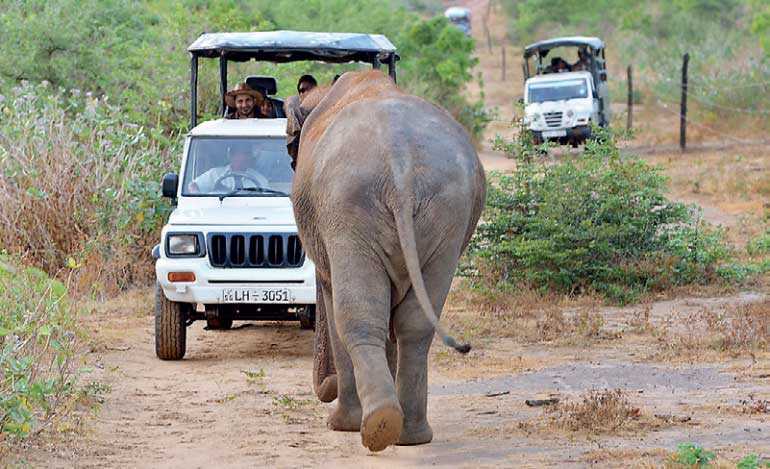Thursday Feb 19, 2026
Thursday Feb 19, 2026
Tuesday, 11 May 2021 00:00 - - {{hitsCtrl.values.hits}}

The Tourism Act No. 38 of 2005 is one of the best pieces of legislation enacted for the development and long-term continuation and growth of the tourism industry in Sri Lanka, giving equal representation to all stakeholders large and small, throughout the industry – Pic by Shehan Gunasekara
 The authorities submit three (3) main reasons in defence of their intent to repeal the current Tourism Act No. 38 of 2005, and replace it with another:
The authorities submit three (3) main reasons in defence of their intent to repeal the current Tourism Act No. 38 of 2005, and replace it with another:
1. It is in the President’s Election Manifesto
2. The merging of the four institutions of tourism will reduce costs, and
3. The lack of SME representation on the boards of these institutions/agencies.
Point 1: The vision for the tourism sector is explained in detail on pages 44 and 45 of the President’s Election Manifesto. These pages, however, contain no reference to a need to change the existing Tourism Act. All of the stated visions for the industry, as detailed on those pages, can easily be achieved by fully implementing the provisions of the current Act.
Point 2: The private sector wholeheartedly endorses the necessity of reducing the operational costs of these institutions. With this in view, a proposal was submitted for the merging of the Sri Lanka Tourism Promotion Bureau (SLTPB) and the Sri Lanka Convention Bureau as they have similar functions, that of destination marketing. In addition, it is proposed that the administrative functions of all of the four institutions i.e. Legal, Finance, Human Resources, IT, et al, be amalgamated. This, too, can be achieved under the current Act.
Point 3: Representation of the Small to Medium Enterprise (SME) Sector: This is the main crux of the matter and which this article wishes to address. The Sri Lanka Association of Inbound Tour Operators (SLAITO) is the apex body, as recognised by the current Tourism Act, representing the Inbound Tourism industry or the Inbound Travel Agents, now more aptly referred to as ‘Destination Management Companies’ (DMCs). As per the Central Bank of Sri Lanka, any company with an annual turnover of less than Rs. 750 million is considered as an SME. Based on this, SLAITO represents the entire cross section of the DMC population in Sri Lanka; ranging from four to five ‘giants’ to the smallest of companies who may have just two to three employees engaging in inbound tourism. 90% of the membership of SLAITO falls into the SME category. The main criteria to obtain SLAITO membership is that the business is registered with the SLTDA and not the turnover or number of tourists each brings into the country.
The Board of Management of SLAITO represents this cross section of the industry with the majority of its members representing SMEs. Several current members of the Board are also members of the Association of Small and Medium Enterprises in Tourism (ASMET). Therefore, it is incorrect to state that the SME sector is not represented on the Apex Body for Inbound Tourism into Sri Lanka. The SLAITO membership is responsible for bringing in approximately 65% of visitors to Sri Lanka and the majority of these are through its SME DMCs.
If further proof of this representation was required, then of the current office bearers of SLAITO, its Treasurer Bobby Jordan Hansen of Columbus Tours, its Immediate Past President Mahen Kariyawasan of Andrew the Travel Company, and Vice President Nishad Wijetunga of Wayfarers Ltd., are all from the SME sector of the DMC community. These three members also represent SLAITO on the Tourism Boards with two of them, Hansen and Kariyawasan, serving on the Board of the SLTPB and Nishad Wijetunga on the Board of the Sri Lanka Institute of Tourism & Hotel Management. This clearly confirms that there is ample SME representation on the Boards of all of the institutions under the current Tourism Act.
Making it all inclusive
SLAITO’s category of Associate Members include many small and medium players in the supply chain of tourism; ranging from small camping and safari operators, to small hotels and ancillary service providers in the regions, such as safari jeep providers and windsurfing service providers, et al.
The reason for extending membership to these smaller service providers in the regions is to make it an inclusive sector where service providers to the industry, who work with the DMCs, also have a voice in SLAITO and representation on the tourism boards that govern and control the industry.
Since 2010, SLAITO has annually conducted the only travel and tourism fair in Sri Lanka, Sancharaka Udawa. The aim of this large event is to create a platform for all of the small and medium suppliers to the tourism industry, especially those based in the regions, to meet the DMC community and all of other public and private stakeholders of the industry.
The fair is conducted over two days and gives unparalleled exposure for the small players in the industry. Space is provided free of charge to all Government institutions involved with the industry such as the Department of Wildlife Conservation, Sri Lanka Railways, Central Cultural Fund, Tourist Police et al, to give all stakeholders in the industry an opportunity to meet with representatives of these institutions. The fair also extends free space to all universities conducting travel and tourism courses so that these students can also participate and gain exposure to the real world of tourism. Entrance to the fair is free of charge.
Education is of utmost importance
On the side-lines of the Sancharaka Udawa, SLAITO organises various seminars, lectures and workshops for the participants to enhance their knowledge on different aspects of the industry and new trends in the industry. This is especially useful for university undergraduates reading for degrees in tourism.
SLAITO’s activities in supporting the small and medium sector does not end with the Sancharaka Udawa. Training workshops and seminars are conducted in the regions for the smaller players in the industry who work with the DMCs. These include Nature Interpretation Programs for safari jeep drivers, soft skills, language skills and training for beach operators on the west coast, for ‘tuk’ drivers in the tourist areas, and also the smaller groups that interact and earn a living from the industry.
If it works, why change it?
Considering all of the above, and as private sector businesses have driven the tourism industry in this country from 1960s onwards, through many a turbulent period, during the 30-year separatist war in the north and east and multiple insurrections in the south, we are convinced that the Tourism Act No. 38 of 2005 is one of the best pieces of legislation enacted for the development and long-term continuation and growth of the tourism industry in Sri Lanka, giving equal representation to all stakeholders large and small, throughout the industry.
Further this is not the time to be looking at changing an Act, but rather, and far more importantly, the time to find solutions to the more pressing problems affecting the industry due to COVID-19 and its impact on the over three million dependents on this industry. Changing the Act will have absolutely no effect on the need of the hour, which is to bring visitors back to Sri Lanka and provide them with a quality experience that will ensure they return again and again. Changing the Act will not achieve any of this!
Encouragement from the top
On 6 May, senior office bearers of SLAITO had a meeting with Minister for Tourism Prasanna Ranatunga, who acknowledged the fact that tourism is a 95% private sector-driven industry and that the Public-Private Partnership (PPP) formula is extremely important for its long-term sustenance and growth.
He gave them an assurance that any and all changes to the current Act would only be undertaken after detailed consultation with the private sector associations. He gave these organisations a period of three months to study the Act and make any recommendations for change, with an assurance that all decisions in this regard would be taken only by him, after consultation with all the stakeholders of the industry.
(The writer is Vice President – SLAITO, Board Director – SLITHM and an SME sector entrepreneur in tourism.)